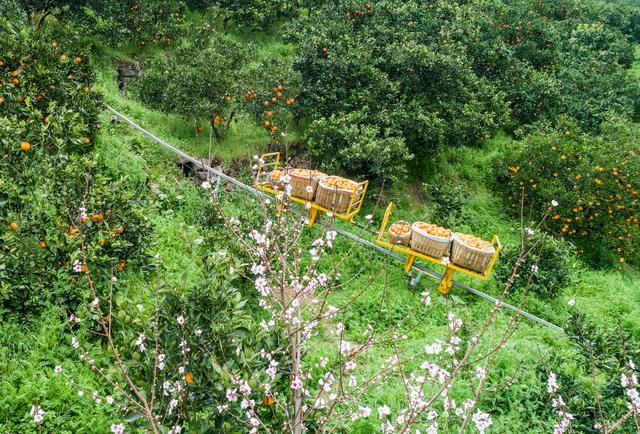China’s local governments speed up development of rural e-commerce
Booming rural e-commerce in China provides a new platform for the circulation of agricultural products for its vast countryside, broadens channels for farmers to increase their incomes, and unleashes the potential of rural vitalization.
To further promote the development of rural e-commerce, local governments throughout China have explored ways to enhance brand building and to improve logistics throughout the country.
Wuchang city in northeast China’s Heilongjiang Province established a website to publicize the city’s Wuchang rice, a famous rice brand in the country, and built a rice traceability anti-counterfeiting system based on agricultural Internet of Things in 2015.

An on-rail vehicle tranports navel oranges in an orchard in Zigui county, Hubei Province on March 13, 2020. (Photo/Xinhua)
Only locally-grown rice up to standard can be included into the system and obtain a traceability and authenticity label and QR code, according to Yu Dianhong, a resident in Lujia village, Minle Korean ethnic township, Wuchang city.
Yu introduced that the system helped solving her problems when she began to sell home-grown rice online a few years ago. Back then, Yu found that it was not as easy as she thought to sell her rice online, as many consumers would question whether her products were actually Wuchang rice. To assure online shoppers, Yu had to show them a photo of her ID card.
Like Yu, many farmers once had trouble selling their high-quality farm produce. However, things have changed since then.
“Consumers can easily confirm the authenticity of my products through a simple visit to the website. They can find out in exactly which village the rice was grown, who grew it, what variety it belongs to and what the examination report says after scanning the QR code on the packaging,” Yu said. “The sales of my products have more than doubled after the establishment of the system,” Yu added.
Brand building brings rural e-commerce onto the fast lane. Continuously promoting the construction of regional public brands will improve the quality, efficiency and market competitiveness of rural e-commerce.
In addition to brand building, it is crucial to ensuring “last-kilometer” logistics for farm produce with short shelf lives, such as fresh vegetables and fruits. It’s believed that addressing inadequacies in rural logistics infrastructure and promoting the establishment of the circulation system in rural areas will drive the vigorous development of rural e-commerce.
In Zigui county, central China’s Hubei Province, electric transportation vehicles running on rails provide a solution to the transportation of fresh navel oranges grown in the high mountains and steep slopes.
Nestled in the high mountains and steep slopes, Yandengbao village in the county’s Guojiaba township is an ideal place for the growth of navel oranges. However, local farmers had to depend on manual labor for the transportation of navel oranges in the past due to poor transportation infrastructure.
In 2019, the village electrified local power equipment by setting up a grid and later erected two electric tracks with a total length of 250 meters between an orchard and a road to transport navel oranges.
With a few simple clicks, the electric vehicles will drive to the orchard under the slopes from the roadside. After farmers load boxes of navel oranges onto the vehicles, they will then travel back along the rails in several minutes.
Liu Guohua, manager of a navel orange cooperative base in the village, highly praised the electric vehicles. “Our base produces 250,000 kilograms of navel oranges per year. For each kilogram, we needed to pay a transportation fee of 0.24 yuan, but it has now been cut to 0.1 yuan, which means we can save 35,000 yuan for one year,” Liu said.
In Zigui, there are 588 routes for on-rail vehicles stretching for 119,300 meters, which transport the navel oranges from more than 40,000 mu (about 2,666.7hectares) of land from the hillside to the roadside.
To introduce the navel oranges transported out of the mountains to the market in other regions, the county has built a village-level logistics service system by mobilizing local express delivery companies, e-commerce enterprises, and rural comprehensive transportation service stations.
Thanks to these measures, Zigui’s navel orange industry has formed a cycle of efficiency where farmers are able to grow high-quality products, logistics can guarantee the efficient transportation of farm produce and farmers’ products are able to sell well in the market, said Liu Haotian, an official with the e-commerce office of Zigui county.
Photos
Related Stories
- Villagers in Jiangxi benefit from improved housing conditions thanks to rural vitalization programs
- Lotus-related industry at heart of village’s drive towards rural vitalization in Hainan
- Internet technology delivers real benefits to China’s farmers, contributes to its rural construction
- County in Zhejiang provides strong financial support to young entrepreneurs returning to hometowns
- Art serves as a welcome approach to help renovate village in SW China’s Chongqing
- China outlines key tasks to fully advance rural vitalization in 2022
Copyright © 2022 People's Daily Online. All Rights Reserved.










